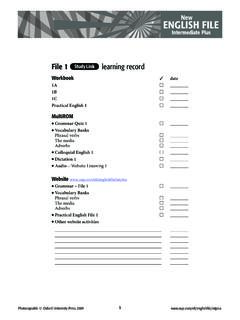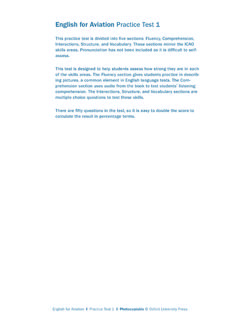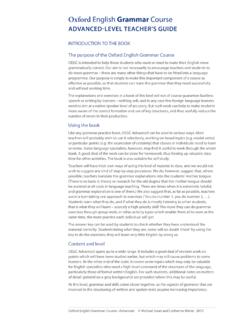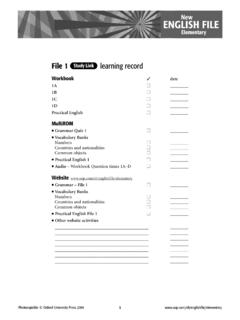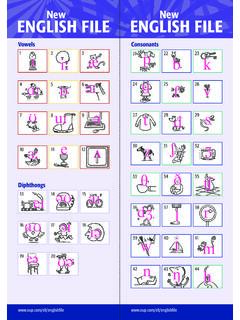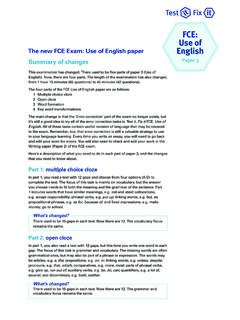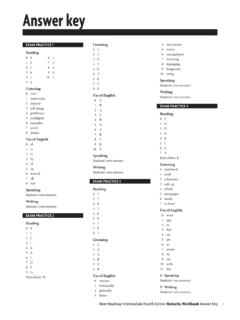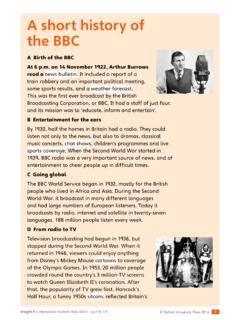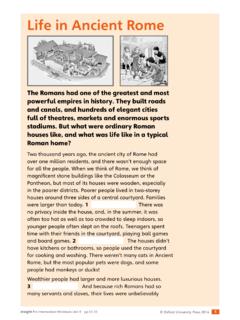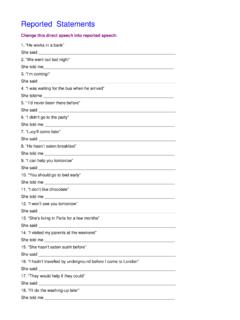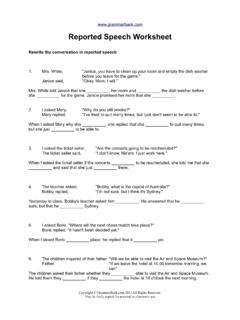Transcription of Section 20 indirect speech - OUP
1 Oxford English Grammar Course Intermediate Michael Swan and Catherine Walter 2013 Section 20 indirect speechpage 281 language notesThe explanations and exercises here are provided for students who really need them. However, for many learners indirect speech is mostly unproblematic. In particular, tenses in indirect speech have nothing special about them: they are nearly always the tenses that are natural for the situation. Compare She was tired because she had been working late and She said she was tired because she had been working late . Both sentences use was and had been working adding She said makes no difference. The main exception is when we report present-tense statements and questions: here we may use past tenses to talk about things that are still true: How old are you? What? I asked how old you were. But in general, there is no need to teach complicated rules about tense changes to most students, and exercises in which students change direct to indirect speech may be unnecessary, as well as being unnatural that isn t how native speakers construct indirect speech , in some languages indirect speech does have special grammar, so some students may have problems:*I told her that I don t understand her problem.
2 *I thought that I would have been late, so I hurried. And some languages do not have a separate indirect speech structure like those in European languages, so speakers of these languages may mix direct and indirect structures:*They told us you must come back tomorrow, but we couldn further activitiesThe two poems are simply provided for students to read. They contain three examples of would in indirect speech reference to the future, but there is no need to base any kind of exercise on this. Leni McShaw is a pseudonym. Wendy Cope is a genuine, very popular and respected poet, who often uses humour for quite serious 282 language notes Students are often taught indirect speech as if it was some kind of relatively mechanical grammatical operation, without being told why it works the way it does. We think it is helpful if students are helped to see the very simple reasons why pronouns, tenses and adverbs may be different in reports from those used by the original speaker.
3 Possible further activitiesExtending exercise 3 Get students to find a short piece of dialogue (perhaps in a language-teaching book), and, as in exercise 3, to underline the words that would be changed if one of the speakers reported the conversation to someone else in another place. Section 20 continuesAn asterisk (*) indicates an incorrect form or English Grammar Course Intermediate Michael Swan and Catherine Walter 2013page 283 language notesSome students languages may use the equivalent of this in cases where English uses that: *He told me he wasn t happy in this job, so he changed 284 285possible further activities Memory test Get each student to tell the class one true thing and one untrue thing about him/herself, using a present tense. ( I ve got three brothers. I speak Arabic. ) In the next lesson, see if students can remember what each one said she had three brothers. Franz said he spoke Arabic, but it isn t beliefs Ask students if they can think of things that people used to believe.
4 Help with vocabulary as believed that the earth was : childhood beliefs Small children believe some very strange things. Give students a few minutes to think, and then ask them to tell the class about things they believed when they were small. ( I believed my mother knew everything. I believed that the teacher lived in the school. )Personalisation: misinformation Ask students to think of things they have been told in their lives (by parents, teachers, politicians, newspapers, boyfriends, girlfriends, strangers, ..) that were not true. (This might be a good moment to look at the first poem on page 281.)page 286language notesThis is a rather complicated point which may be worth looking at with more advanced further activitiesThe cartoon is simply an illustration of the structure. No activity is necessary. For students unfamiliar with Christian pictorial conventions, it may be necessary to explain that the people with wings and haloes standing on clouds are in heaven.
5 Page 287language notesIn casual speech , indirect questions may sometimes have the same structure as ordinary questions (see the note at the bottom of the page).He wanted to know when could I may meet examples, but it s better not taught at this further activities Personalisation Ask students to write one or two sentences about questions that they have been asked at interviews, or on forms. Tell them about some you have been asked: They asked me if I had a place to asked me where I went to school. Section 20 continuesOxford English Grammar Course Intermediate Michael Swan and Catherine Walter 2013 Memory test Ask each student a question: How many languages can you speak?Do you play tennis?In the next lesson, ask students to remember what you asked:You asked Maria how many languages she asked Lee if he played Ask students if they can find some interesting sentences on the internet beginning The policeman asked me .Answers to questions Ask students to complete some or all of the following sentences:I don t know where.
6 I don t want to know whether ..I don t care when ..I don t remember why ..page 288language notesSome students may tend to drop to from the infinitive after how, where etc.*I didn t know how further activities Typical promises What do students promise their families, friends etc before they go to university, or go travelling? Do they usually keep their promises? Can students give any personal examples? Personalisation Get students to write one or two sentences about advice or instructions they have been given, for example by teachers or parents, using .. told me/us (not) to .. or: Alternatively, get younger students to say what advice they will give to their children, using I ll tell them (not) to ..page 289 possible further activitiesCartoon: The cartoon illustrates the use of would (unchanged) after a past reporting verb. As with the cartoon on page 286, some explanation may be necessary for students unfamiliar with Christian mythology and pictorial conventions.
7 Presumably the dead man is being screened by St Peter for entry into Students might be interested in checking the accuracy of the first explanation. Suggest they look for the following: He said his wife had been People believed that dinosaurs had been People believed that dinosaurs were
